 Unless you’ve been living under a rock that doesn’t get WiFi for the last few days, you’ve likely heard the story of how the United States lost the Ryder Cup. Leading the European team 10-6 going into the Sunday singles matches, the U.S. got off to a slow start, and although they did manage to knock over a few dominoes in the middle of the day, a par putt on the 18th green gave the victory in the penultimate match to former world number one Martin Kaymer.
Unless you’ve been living under a rock that doesn’t get WiFi for the last few days, you’ve likely heard the story of how the United States lost the Ryder Cup. Leading the European team 10-6 going into the Sunday singles matches, the U.S. got off to a slow start, and although they did manage to knock over a few dominoes in the middle of the day, a par putt on the 18th green gave the victory in the penultimate match to former world number one Martin Kaymer.
The normal Ryder Cup formula was reversed, in that the Euros got down in team play and made it up in the singles. The U.S. team, which looked poised to clinch the Cup well before the so-called anchors of Steve Stricker and Tiger Woods came down the stretch, was set up well, with it’s high-energy youngsters starting off play.
But in the end, the Stateside team was no match for, as I put it last week, Ian Poulter’s fist-pumps and patriotism.
Number Five: The Miracle at Medinah
Conflicting reports have come out of Chicago as to the nature of the crowds, especially on Sunday. For the first time, as far as I know, two different golfers decided to forgo the usual tradition of waiting for the crowds to silence before hitting their shots, as Bubba Watson and Ian Poulter repeatedly asked the gallery on the first tee to keep the cheering going straight through their swings. I doubt this will become the norm on Tour, especially as Bubba nearly took out few spectators on his opening tee shot Sunday, but it was interesting to see happen. I think we’ve all long suspected that white, unchanging noise wouldn’t be all that much different from no noise, and for the most part that seems true.
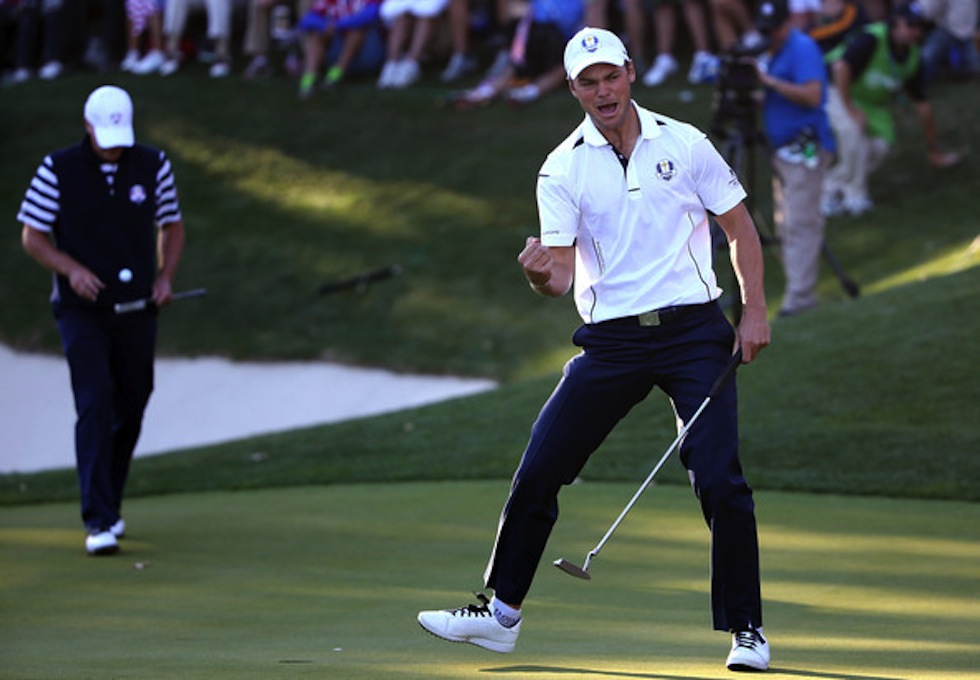
As for the overall crowd noise, it seemed to be very up-and-down. Keegan Bradley was able to get them into it with big putts, but there was a strong consortium of European support that substantially nullified the U.S.’s home-course advantage. I’m of two minds of the course itself as well.
Despite watching nearly every hour of coverage, the first dozen or so holes still meld together in my mind. The last few, though, were consistently great. It started with the short par-four 15th, which was the most important in terms of strategy, and the long par-four 16th, which gave long hitters a huge advantage off the tee.
The 17th was probably the most exciting hole of the tournament, as many desperate comeback attempts were met with a watery (or sandy) grave. The 18th, completely owned by the Euros, was a great way to end, as the right-side fairway bunker made for an interesting risk-reward off the tee. Especially on Sunday, with the hole cut in the front-right, the fairway’s right-to-left slope made the back of the green a common landing spot, and a tough putt (just ask Jim Furyk).
Number Four: The Captains
As the losing captain, Davis Love III is obviously going to come under the most scrutiny, and in his case it’s for good reason. I, and many others, have been very critical of Love’s captains picks, specifically Furyk and Stricker. Before the picks came out I said that mine would have been Rickie Fowler, Dustin Johnson, Hunter Mahan, and Nick Watney, and those are picks I stand by. It’s hard to say Furyk and Stricker didn’t deserve the picks, but I was (and am) of the opinion that the U.S. team needed to get younger, and guys like Fowler and Mahan (two players already with Ryder Cup experience) would have been good fits. Furyk and Stricker each went oh-for the Ryder Cup, and Snedeker went 1-2. Dustin Johnson was the lone bright spot.
Love’s day-to-day picks have also come under fire, specifically his sitting of Mickelson and Bradley on Saturday afternoon and his refusal to break up the Tiger/Stricker pairing after their 0-2 start.
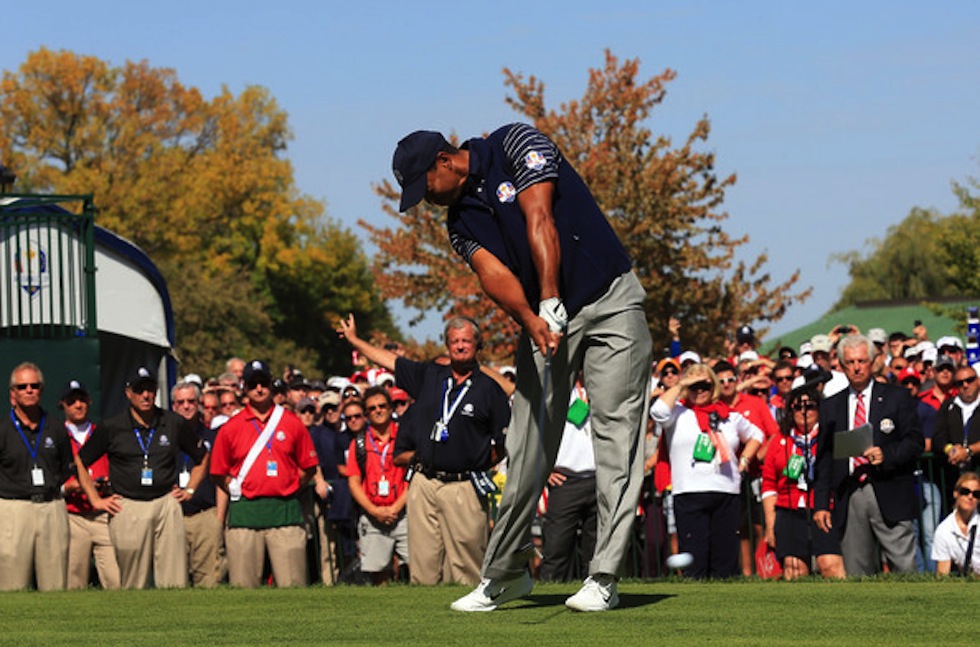
José Maria Olazabal’s actions are somewhat harder to pick apart. His first captain’s pick Nicolas Colsaerts went 1-3, though his amazing putting streak Friday afternoon single-handedly held off a hard-charging Tiger. And then there’s Ian Poulter.
Number Three: Meet Ian Poulter, America
Ian Poulter’s solo golfing resume isn’t particularly great. He has just one win on the PGA Tour, at the 2010 WGC-Accenture Match Play (fitting, I suppose), as well as 10 other European Tour wins. He has just six career top-10s in major championships, and, statistically, he isn’t great in many facets of the game.
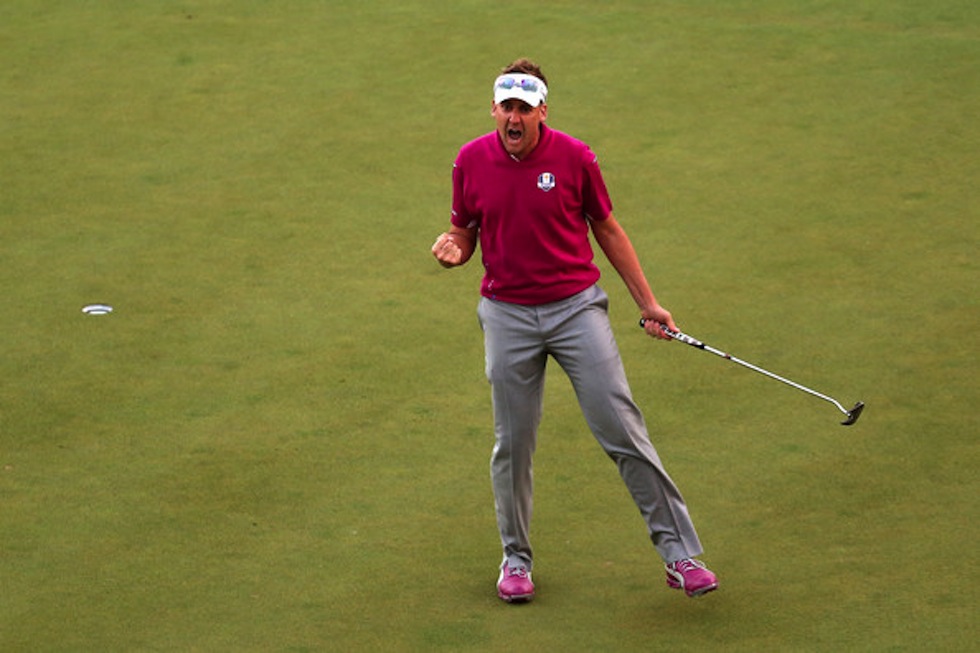
But somehow, someway, Ian Poulter now has the best winning percentage of any Ryder Cup golfer in history that has played at least 15 matches. Better than Seve, better than José Maria, better than Jack, better than Palmer, better than Watson. Ian Poulter!
He plays a game that’s up-and-down, but when given an opponent to sneer at and a crown to feast off, Poulter somehow kicks his game into another gear.
Number Two: Collapse or Comeback?
After every sports collapse/comeback, the same question is inevitably raised: did the winning team win it, or did the losing team lose it? This is almost always a false dichotomy, but let’s delve a little deeper, matchup by matchup.
We start with the first match of the day, which Luke Donald won 2&1 over Bubba Watson. Watson didn’t play as well as he did the first few days, but Luke made some big shots coming down the stretch, so that’s a win for Luke. Poulter’s victory 2Up over Simpson was a win for Poulter, as was McIlroy’s 2&1 finish over Bradley. Justin Rose beat a smiling and clapping Phil Mickelson with two crazy putts on 17 and 18, so that’s another win for the Euros (they’re up 4-0, for those counting at home).
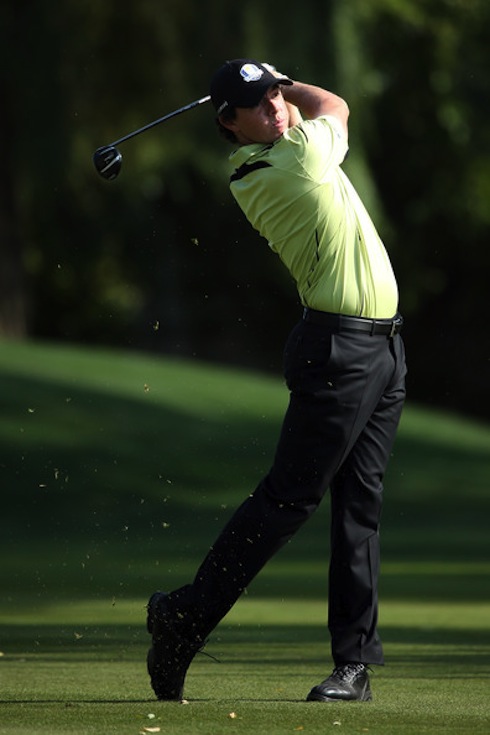
The next matchup was Paul Lawrie. Normally I’d find it tough for Lawrie to defeat FedExCup champ Brandt Snedeker without a collapse, but the 5&3 scoreline speaks for itself. The U.S. won the next two matches (DJ 3&2 over Colsaerts, and ZJ 2&1 over GMac), so let’s look past those, along with the matchup Dufner won 2Up over Peter Hanson.
Europe’s next “W” was Sergio Garcia 1Up over Jim Furyk. This is really the first time you can say the U.S. collapsed, so we’ll give them a point there. The Lee Westwood/Matt Kuchar match is a tough one to score, as Kuchar just came out flat, but I’ll give Westwood the point for beating a normally tough match play opponent. The Kaymer/Stricker match ended up being the deciding group, and as mediocre as Kaymer played, I think you have to put this one in the “U.S. lost” category.
The last one is Tiger and Molinari, which was halved (though both players watched Kaymer make the deciding putt from 150 yards back in the 18th fairway, and given their approaches you’ve got to imagine Tiger would have pulled out the victory if it actually meant anything), so I’ll disregard it.
Adding that up, we have “Euros won” with six, and “U.S. lost” with two. The defense rests.
Number One: Odds and Ends
- The only match of the entire Ryder Cup that ended in a halve was the singles grouping of Tiger Woods and Francesco Molinari Sunday afternoon, which Tiger almost ended with a near-miss chip-in and then a lipped-out par putt.
- As the story goes, Phil Mickelson begged out of the Saturday afternoon four-balls. That’s fine, given his age and the score at the time, but why did red-hot Keegan Bradley have to sit as well? Stricker was playing so poorly, Davis Love could have paired Tiger with Michael Jordan and that match might have turned out better.
- Tiger himself has said that he gave up after seeing Kaymer clinch the Cup. Not exactly something you hear athletes admit every day.
- Rory McIlroy arrived at his Sunday morning tee time only 10 minutes before he was scheduled to begin his match, after he misread the time zones on the tee sheet.
- Deputy Chief Patrick Rollins, the police officer who drove McIlroy to the golf course, said that he “was just doing [his] duty.” You’ve got to imagine he’s getting a lot of cell phone calls from distressed (or just lazy) golfers this week asking for a police enclave.
- This year’s Ryder Cup drew the biggest ratings since the 1999 version, per NBC’s PR Twitter account.
- Watching via NBCSports’ online streaming, I can’t tell you how many times I saw the commercial for NBC’s new show, “Chicago Fire From Executive Producer Dick Wolf of Law and Order” (pretty sure that’s the official title). I think I’m actually less likely to watch it now that I can recite the entire advertisement. “How long have you been a firefighter?” “Since the day I was born.” It was no 2004 ALCS House M.D. “You’re risking a patient’s life!” but it was solid.
- LPGA golfer Sandra Gal wrote an article for Golf.com after attending the Ryder Cup.
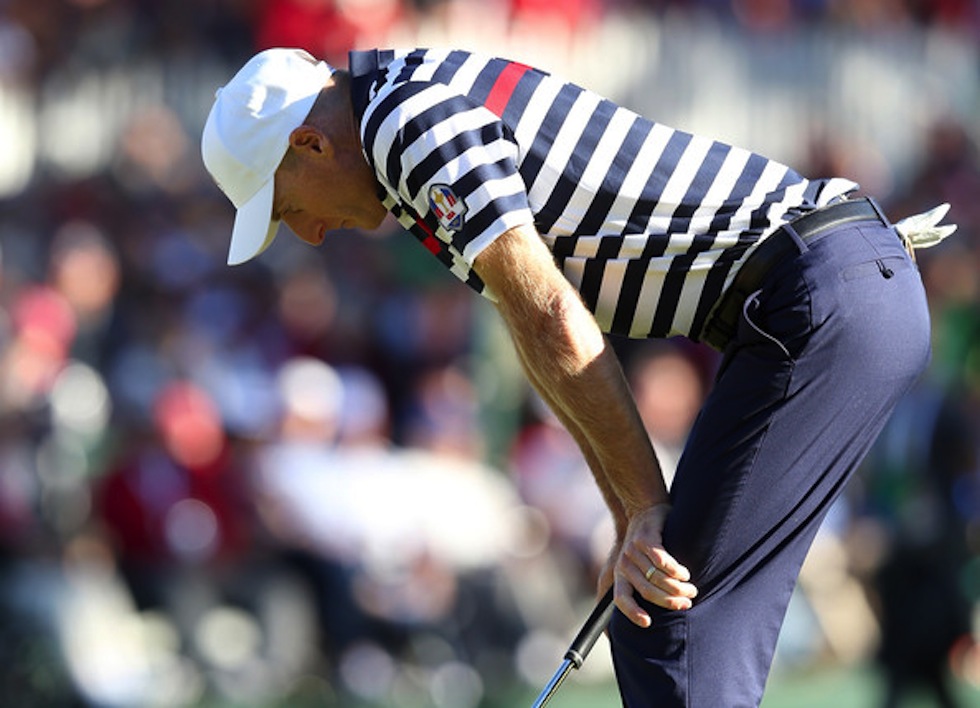
Closing and Your Thoughts?
Went I started writing this, my intent was not to dwell on a few mistakes that the U.S. side made. One missed putt by Martin Kaymer and a made putt by Jim Furyk would have won brought the Cup back Stateside, and we would be talking about how the European team looked flat or how José Maria didn’t set up his singles order for success. But the U.S. did lose, and in spectacular fashion, so criticisms and changes must be made. Lessons need to be learned.
In the end, the 2012 Ryder Cup should be remembered in the same vain as the 1999 Ryder Cup, in that one team went out and took it. There wasn’t that one Justin Leonard putt that we can look to from 2012 and say “Wow, the Euros really pulled it out in the end!” but excellent play during the early Sunday matches put pressure on the U.S. team, and they failed to battle back.
At the very least it was and exciting three days of golf, and now we can only hope the U.S. teams learns from their mistakes and comes back stronger in 2014.
Photo Credits: © David Cannon, © Andy Lyons, © Andrew Redington, © Ross Kinnaird, © Andy Lyons.

My analysis – the European sportsmen beat the American businessmen.
Ian Poulter and the Europeans said, “hey, we’ve got Sunday tee times, let’s go play golf.”
The Americans said, “let’s go to the office and get this finished.”
Enthusiasm carried the day over mechanical inertia. Not to single out Jim Furyk, but his measuring and realigning each putt six times in the later holes tossed his rhythm out the door. USA did a real “tighten up” on the later holes.
Take a look, and hit it. That’s what Love and Co. would tell us if we won a half hour lesson with one of them. When the pressure was on, the Americans tried too hard to be perfect instead of just playing golf.